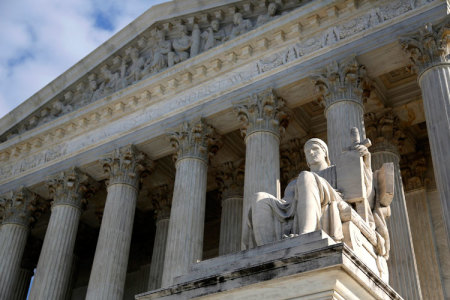Town of Greece Decision May Change How Supreme Court Looks at First Amendment

WASHINGTON – A lawyer involved in a major church and state Supreme Court case has said that the decision may change how the Court interprets religious expression in the public sphere.
Last month, the highest court in the land ruled in Town of Greece v. Galloway that a New York State town can have Christian invocation prayers before its monthly town meetings.
Thomas M. Johnson, Jr., associate with Gibson, Dunn, & Crutcher's office in Washington, D.C., who worked on the case, told The Christian Post that with the decision the Court might be moving away from the Lemon Test.
The Lemon Test is the paradigm the Supreme Court has used in the past to determine whether something on public property violated the Establishment Clause of the U.S. Constitution.
Lemon has been criticized by some legal experts for not being clear enough on what constitutes an unlawful endorsement of religion by the government.
"I think at minimum [Town of Greece] shows that in this context, the endorsement test is unworkable. The Supreme Court essentially said that," said Johnson to CP, who called Greece "a great case."
"It applied a much more historical coercion based test and I think that any fair appraisal of application of the test in other contexts would reach the same results. So I'm hoping that the dominoes will start to fall as courts grapple with the next set of cases."
Johnson's comments came as he was the featured speaker for a Family Research Council event on Wednesday afternoon regarding the ramifications of the Greece case.
Titled "Praying in Public: Greece v. Galloway and its Implications for Religious Liberty," Johnson was a last minute substitute for Thomas G. Hungar, lead counsel for the Town of Greece before the Supreme Court.
"I jumped at the opportunity. I love talking about this case. It was a great case and I'm happy to have been able to do it," said Johnson to CP.
Travis S. Weber, director of the Center for Religious Liberty at FRC, gave the introductory remarks for those watching in person and via webcast.
"We are heartened to see this decision from the Supreme Court that affirms the presence of religion in public life and public gatherance," said Weber.
In May, the Supreme Court ruled 5 to 4 that the leadership of Town of Greece can hold explicitly Christian prayers before their monthly town meetings.
"The Court must decide whether the town of Greece, New York, imposes an impermissible establishment of religion by opening its monthly board meetings with a prayer. It must be concluded … that no violation of the Constitution has been shown," read the majority opinion, authored by Justice Anthony Kennedy.
The decision ended a nearly six-year-old lawsuit offered by residents of Greece who considered the opening prayers unconstitutional given they were periodically sectarian in nature.
Alliance Defending Freedom Senior Counsel David Cortman, whose organization helped represent Greece during the trial, declared that "the Supreme Court has again affirmed that Americans are free to pray."
"In America, we tolerate a diversity of opinions and beliefs; we don't silence people or try to separate what they say from what they believe," said Cortman. "Opening public meetings with prayer is a cherished freedom that the authors of the Constitution themselves practiced."
During his remarks Wednesday, Johnson discussed the arguments made for and against Greece's prayer policy, and how the Justices made their ruling.
Johnson also spoke about how the case may influence future lawsuits over religious expression on government property or during public meetings.
The FRC event on the Town of Greece came as the highest court is expected to soon deliver the decision of another religious liberty case.
In Sebelius v. Hobby Lobby, a Christian family-owned retail chain hopes to get an exemption from the Health and Human Services' "preventive services" mandate.
While arguing against a religious liberty appeal in Hobby Lobby, the federal government did submit an amicus brief in favor of the prayer policy of Town of Greece.
When asked by CP about this apparent contradiction, Johnson responded that the "quite simple" answer was that the solicitor general and his associates must always make the best case for the federal government's side.
"I think they took a long look at the practices of the Congress and they had meetings with both parties about the facts of the case and they determined that what Congress was doing was similar to what the town was doing," said Johnson.
"The rule is that if they are able to do so they need to make the best argument that they can in defense of constitutionality of federal action, whether that be embodied in a federal statute or in my case, embodied in the practice of the Town of Greece."





















